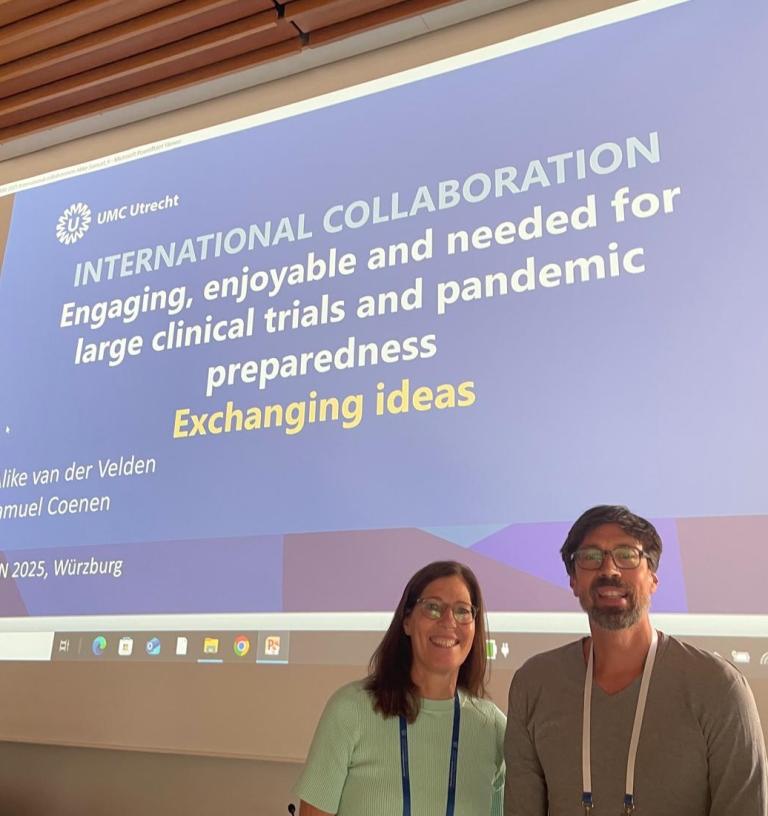Primary Care Platform Trial for Respiratory Infections Launches Third Treatment Arm
Europe’s first adaptive platform trial for COVID-19 and COVID-like illness in primary care reaches a major milestone with the launch of its third treatment arm. The first participant has now been randomised into the LTX-109 study at Waarloos Medical Practice in Belgium, marking an important step forward for this pioneering trial.
Funded by the European Commission's Horizon Europe programme, the pioneering platform trial in primary care is currently evaluating the effectiveness of three potential treatments in parallel: Nitric Oxide Nasal Spray, Saline Nasal Spray and now LTX-109 Nasal Spray. The trial is being carried out by a mature primary care network of national coordinating teams and general practitioners in eight European countries.
Building Europe’s Pandemic Preparedness
ECRAID-Prime is at the basis of a sustainable clinical research framework in primary care that can aid policymakers and healthcare systems in responding rapidly and effectively to future outbreaks. By focussing on community-based treatments, the five-year project aims to test treatments for respiratory infections that can be deployed before patients require hospitalisation.
Its focus on primary care complements Europe’s broader vision to build a lasting, integrated, comprehensive and sustainable European clinical research preparedness and response capacity that spans intensive care units, hospital wards and primary care.
Connecting Research with Primary Care Practitioners
Having been involved in the trial from the very beginning, Stefan Morreel and his team at the General Medicine and Population Health department – part of the University of Antwerp – have been actively involved in the primary care research network, which traces its roots back to the early 2000s and has grown across numerous EU-funded projects and initiatives.
“Our goal with the ECRAID-Prime trial has been to build a long-term collaboration with our sites. We’re very pleased to launch this third treatment arm and hope to see more sub-studies develop in the future.”
As both a general practitioner (GP) and the network’s national coordinator for Belgium, Stefan (right) is passionate about connecting research, teaching, and everyday practice by bringing research into the consulting room, and practice back into research and education.
“The Waarloos Medical Practice (Artsenprakijk Waarloos) is a great example of this: a state-of-the-art suburban family clinic near Antwerp where GPs are truly enthusiastic about contributing to research. They included their first patient just days after training, which is ideal because the new knowledge is still fresh and immediately applied."
"To all sites and GPs participating in the trial, just keep going – we’re making great progress. We recognise that recruiting and including patients during busy consultations can be challenging, and that each site works under different circumstances, with its own facilitators and barriers that can influence recruitment pace – that is completely understandable. It is your dedication that keeps our study moving forward!”
From Learning to Implementation
From an operational perspective, the journey of setting up the platform trial up to activating its third treatment has not been without challenges. The consortium, together with its trial operations team and dedicated national coordinating teams, had to navigate a complex landscape of regulatory and ethical approvals in Europe to set up the complex trial.
Recounting the first two years of the project, trial lead Alike van der Velden, who coordinates the consortium with Chris Butler, said, “As one of the first adaptive platform trials in primary care to successfully complete the ethical and regulatory CTIS (Clinical Trials Information System) submission process, we were all on a steep learning curve. Once the groundwork had been laid and the master protocol, NONS and Saline spray interventions were approved, the LTX-109 approvals went smoothly – thanks also in part to our continued and constructive collaboration with the Belgian Federal Agency for Medicines and Health Products, which is the reporting authority for ECRAID-Prime.”
Recruiting participants for the trial has also been a valuable learning experience: participants can only be recruited if they visit their GP early in the disease trajectory, thus limiting recruitment opportunities. The trial operations and national coordinating teams are therefore exploring extending recruitment to pharmacies and a decentralised approach, where participants can be recruited online without having to visit their GPs.
Collaboration at the Heart of Success
The trial operations team remains closely engaged with the national coordinating teams to continuously refine procedures through active dialogue. Following feedback from the GPs, recruitment and follow-up procedures have been simplified. By reducing the burden on both GPs and participants, the teams hope to further boost recruitment in the upcoming winter season.

Alike, who recently spoke about the Primary Care Network at the Annual Conference of the General Practice Research on Infections Network, expressed her pride in the national coordinators’ achievements in primary care research.
“I am so proud of what we have collaboratively achieved in primary care research and cannot emphasise enough the vital role of international collaboration for large clinical trials such as ECRAID-Prime to strengthen Europe’s pandemic preparedness.”
Proof of Principle: Adaptability in Action
Commending the consortium’s teamwork and dedication, Chris, who recently spoke at the AVG and IMRP conference in Singapore, said, “Very few adaptive platform trials have successfully added and activated treatment arms in this way."
"This achievement proves that our trial is adaptable, efficient and capable of delivering on its promise.”It’s not too much of a gross understatement to say that the future of humanity depends, in part, on efforts like ours. As new drugs are developed, we must ensure that we do our best to fully utilise this framework to its greatest potential. There’s no other network quite like ours to do so.”
As we inch closer to the start of the next flu season, the consortium is ready to build on this success and continue strengthening Europe’s trial capabilities. Chris concludes, "We are working hard to achieve sustainability for this important research infrastructure, generate critically important findings about treatments for seasonal infections and increase our readiness to respond swiftly when the next pandemic hits.”
Follow the trial's progress on https://ecraid.eu/ecraid-prime/studies.
-